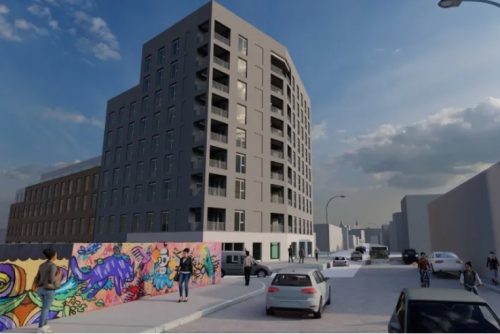Planning Inspectorate backs council in refusing co-living development

Liverpool City Council has been vindicated after refusing planning permission for a co-living residential scheme in the Baltic Triangle area.
Councillors unanimously turned down the plans at the January 18, 2022, planning committee put forward by Crosslane Co-Living SPV1, Wates Group, and Ascot Property.
They wanted to create 236 co-living apartments and ground floor commercial space on the site of the former Bogans Carpet building in New Bird Street.
The applicants said the scheme would create 223 construction jobs and 18 jobs on-site following completion.
Rooms would cost between £900 to £1,100 per month.
However, council officers recommended refusal because the plans are for all single occupancy studios, 192 of which do not comply with the Nationally Described Space Standards, for accommodation.
David Wilson, development manager for Crosslane, argued that, to refuse permission is “counter-intuitive to policy”, adding “the application of space standards is not detrimental”.
But Cllr Helen Thompson, deputy chair of the committee, said: “It looks like a big HMO (house of multiple occupation) to me.”
Mr Wilson responded: “People will sleep in their rooms, but live in the building.”
Developers appleased the decision to refuse, and the Planning Inspectorate has now delivered its verdict, and backed the council.
The case hinged on whether the proposal would provide a satisfactory mix of dwelling types.
Delivering the conclusion, the inspector said: “The proposed scheme conflicts with the development plan when taken as a whole. Other considerations do not outweigh this finding. The appeal is, therefore, dismissed.”
The inspector notes: “The appellant has emphasised the importance of the communal facilities for the wellbeing of residents, but this requires that facilities are readily available for residents, when they need them. Without this, there is a risk that occupiers could end up being (sic) spending long periods in their apartments, which is a particular concern as the majority do not meet the minimum standards.
“The images provided in the submissions show attractively designed and furnished spaces, and the management plan includes details of cleaning and maintenance of the shared kitchens and other areas.
“I do not doubt that an attractive living space could be provided. However, the overall level of shared amenity space does not make up for the deficiency in individual unit size, and, if is necessary to book some of the spaces, the extent to which the facilities would be readily available to occupiers is also uncertain.”
The inspector added: “The majority of the proposed studios would not meet the minimum space standards, and it has not been demonstrated that the communal spaces would be sufficient to make up for this deficiency. I am, therefore, unable to conclude that the scheme would provide a satisfactory standard of living, with particular regard to space standards.
“The scheme would fail to provide an appropriate mix of housing. Furthermore, although the scheme would make adequate provision for accessible housing, it has not been demonstrated that the scheme would provide adequate private and communal space to ensure satisfactory living conditions for future residents.”








